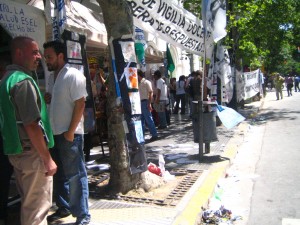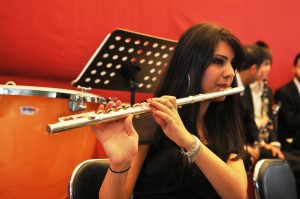Search Results for Tag: Teaching
Degrees and educational milestones
The week seems to have gone great! I’ve read the entries by Kathrin and Emmy from the Global Media Forum, which I find quite interesting. In spite of the red tape that prevented me from visiting the conference and meeting my fellow bloggers, several positive things relating to education happened to me, as well, this week. They brought about a storm of emotions, but they also gave some food for thought.
First of all, shortly before the launch of our education blog, a group of my adult students and I took part in an international English exam. And I’m really glad to hear that most of my students passed it successfully and got their certificates from Europe this week!
![]() read more
read more
In favor of a critical approach to the digital world
Wow! I’ve found the Global Media Forum really interesting so far. The first thing that stood out to me was the diversity on display – people from lots of different countries mix at the conference, some in suits, some more casual or in business wear. There are lots of colorful dresses, men from Africa in robes and women in headscarves. The clothing is just an outer signal of how many cultures are represented here. And in the middle of it all are my fellow bloggers and me.
![]() read more
read more
The silence of Russian educators
Reading Maria’s entry where a teachers’ strike was discussed made me think about dissatisfaction with the Russian education system – both from teachers and others.
What surprises and worries me most is that our teachers never organize strikes or try to make their voices be heard. It happens neither in small cities nor in big ones. I know that most of our university professors do some tutoring or give private lessons throughout the year to earn additional money (for example, before high school students enter a university, their parents often find somebody to give a term-training course to prepare a teenager for the entrance examination). I think a collective demand for better salaries or modern equipment is reasonable – it might result in improving the situation in the whole region (or even several regions), and it is not about giving benefits to any single teacher.
![]() read more
read more
Empower the student to learn
At the beginning of the week I was talking to my coworker Patricia about how education is approached in our country. She coordinates a regional program aiming to strengthen technical education in different fields, like math, science, industry-applied technology and school management. The program’s various groups in different regions of the country do not work directly with students; they work with teachers and school principals. The aim is to train educators and hence improve technical education by setting higher standards.
![]() read more
read more
Teachers: taking action at the root
In March this year, there was a huge strike from the teachers’ union in which they demanded a salary raise. Every year, the timing works out almost identically: the academic year in Argentina starts in March, and some three weeks to a month before that, negotiations with the union take place. There was the threat that classes would not actually start because no agreement had been reached. Teachers in Argentina have some of the lowest wages in society, so it’s very common that they have to overwork themselves to make a decent living.
![]() read more
read more
Transfixed by the TV screen – to whose benefit?
A friend will ask me occasionally, “Have you seen the latest episode of…” – and then name some program. I usually answer, “You know, I haven’t watched TV for about 2 years.”
Strange, isn’t it? But actually it’s all quite simple: I find nothing interesting or noteworthy in the most well-known channels. When there’s anything educational, I can also easily find it in the Internet. And many in my generation do the same. It’s not that the Internet penetrates more and more into our lives – it’s that it substitutes many spheres of our lives that intelligent young people are not satisfied with. So what’s the connection with education here?
![]() read more
read more
Kathrin on Skype: “Kids should learn together longer”
From broken windows to broken homes?
During my studies I had several periods of teaching practice where we worked in state schools as language teachers for four to six weeks. I dealt with both a gymnasium, where mostly talented pupils study, and a typical school on the outskirts of my city. So, I can compare them and share a couple of my ideas about what I saw there.
![]() read more
read more
Musician, teacher – or both?
Once you’re in your fifth year of studies to become a teacher in Iraq, you start training in a primary school or a kindergarten. It takes about forty days, and on some of them, your professors come to the class and evaluate your teaching. When they’re there, it’s important to give an exam that shows off your abilities and what have you learned during those five years.
![]() read more
read more
Smartphones, smarter learning
“Hey, do you have that new mobile phone application for transferring money from your bank account to your phone?”
“You mean I can now pay my electricity bill with my phone?”
“Is your phone twin-sim?”
…these were the kind of discussions I came home to after two years of being away. So much had changed.
![]() read more
read more

















Feedback